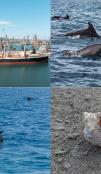Setting the course for a sustainable blue planet

"The EU and its Member States combined have the largest Exclusive Economic Zone in the world and therefore an important responsibility and political role to play when it comes to ocean governance. However, with nearly two-thirds of the world's ocean being beyond national jurisdiction, it is obvious that our ambitious domestic action must be matched by effective and collaborative international efforts. With our updated International Ocean Governance Agenda, we aim to further strengthen our role as a driving force and credible partner on ocean governance at multilateral, regional and bilateral level.”
- Josep Borrell, EU High Representative for Foreign Affairs and Security Policy
"The decline of the ocean is accelerating as unsustainable human activities and their harmful impact continue to degrade the ocean. The ocean needs better care. The EU has a leading role to play in strengthening international ocean governance. Amongst its priorities, the EU will act to halt and reverse the loss of marine biodiversity, fight climate change and marine pollution for a healthy ocean, protect the seabed from harmful practices, ensure a sustainable blue economy and a level playing field, and build up ocean knowledge. The EU will commit EUR 1 billion for ocean and coastal biodiversity globally.”
- Virginijus Sinkevičius, Commissioner for the Environment, Ocean and Fisheries
International ocean governance strives to address the many challenges stemming from the ocean’s multidimensional and interconnected role. In 2016, the European Union was the first major economy to launch an International Ocean Governance Agenda and commit to a safe, secure, clean, healthy and sustainably managed ocean. The updated agenda addresses the points below, among others:
- Fighting climate change and environmental degradation are among the top EU political priorities. The ocean is embedded in the European Green Deal and in the vision for a stronger Europe in the world and is a global issue requiring a multilateral response.
- The decline of the ocean is accelerating as unsustainable human activities and their harmful impact continue to degrade the ocean leading to profound changes with the risk of reaching tipping points. The ocean’s state of emergency is echoed in the limited delivery of relevant global commitments, notably the Aichi Targets under the Convention on Biological Diversity (CBD) and the UN 2030 Agenda for Sustainable Development and its Sustainable Development Goal 14 (SDG14 - Life Below Water).
- The ocean is amongst the world’s foremost geopolitical arenas as shown by the recent increase in tensions in the Eastern Mediterranean and the South China Sea, with Member States calling for respecting territorial integrity and navigational rights as well as for a peaceful dispute settlement. Russia’s military aggression against Ukraine is affecting the global stability and the security of the Black Sea region and is raising concerns about its maritime implications.
- The ocean has gained political traction at the global level and 2022 is a pivotal year for the ocean with several key negotiations and ocean conferences taking place. The ocean has become more prominent in international debates on climate and biodiversity as well as the seafarer crisis, exacerbated by the COVID-19 pandemic, which highlighted the importance of the social dimension, of decent working and living conditions for seafarers.
With the largest combined Exclusive Economic Zone in the world and considering the above-mentioned developments, it was essential for the EU and its Member States to reaffirm and update their commitment towards an improved ocean governance.
Read the full Joint Communication on the EU’s new International Ocean Governance agenda
Save our Ocean, Protect our Future: |
| UN Ocean Conference |
| The EU will participate in the UN Ocean Conference, co-hosted by the Governments of Kenya and Portugal, that will take place between 27 June to 1 July. This comes at a critical time as the world is seeking to address many of the deep-rooted problems of our societies laid bare by the COVID-19 pandemic and which will require major structural transformations and common shared solutions that are anchored in the SDGs. To mobilize action, the Conference will seek to propel much needed science-based innovative solutions aimed at starting a new chapter of global ocean action. |
| #EUBeachCleanup |
| Every year the EU together with the UN organises a global #EUBeachCleanup to protect the ocean. This initiative reaches its peak around World Coastal Clean-up Day, the largest clean-up drive for beaches and coastlines across the globe. |





